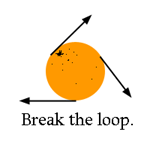

 | Tangentium |
All material on this site remains © the original authors: please see our submission guidelines for more information. If no author is shown material is © Drew Whitworth. For any reproduction beyond fair dealing, permission must be sought: e-mail drew@comp.leeds.ac.uk. ISSN number: 1746-4757 |
Comments PageTangentium actively solicits comments and suggestions. Feel free to contribute any of the following:
...in short, observations or suggestions for ANY aspect of this site. Follow this link to read a brief discussion of why we believe this is important. To submit a contribution please e-mail the editor directly, after having read the following: 1) Tangentium tries to include as many contributions as possible, but we do not guarantee to publish all contributions. We will acknowledge all contributions and send an email stating whether or not (and when) the contribution will be added to the site, but we will not enter into correspondence regarding why a particular contribution was rejected. 2) We will not accept anonymous contributions. All contributions must be accompanied by an e-mail address and name so, if we feel it necessary, we can check the identity of contributors. If you wish to avoid having your name attached to the contribution we will respect this, however. 3) Copyright on contributions remains with the contributor. If Tangentium receives requests to publish the material elsewhere, we will pass these on to contributors. (Here see also the small print on submissions.) 4) Directly commercial contributions are unwelcome, although if you wish to place a link within a contribution to a commercial site (for whatever reason), this is acceptable. 5) Contributions must not have been published elsewhere (offline or online), nor be being considered for publication elsewhere, at the time of their submission to Tangentium. 6) If a piece is published elsewhere after its publication in Tangentium, that subsequent publication must include an acknowledgement that the piece was originally published in Tangentium. DiscussionIn web design one is told to avoid the "Under Construction" sign (although they appear all over the WWW, regardless). The reason being that a good web site is always under construction. That's closer to true hypertext. In a real hypertext environment (which to the best of my knowledge has yet to emerge anywhere), texts would be so integrally linked that when one was updated, all the texts throughout cyberspace that had used that other text somehow would also be updated. Meyrowitz (in James Nyce and Philip Kahn's From Memex to Hypertext, 1992, p. 301-2) called this a "hot link". The best parallel is with a spreadsheet, where changes to a value cause other dependent values to immediately update. Of course we don't have that on the Web. But so many sites don't even try to implement hypertext even in a minor way. Linking pages is a start, but it's only a start (just as voting is only the starting point of democracy, not an end point). Why assume that once a text is published, it is then absolved forever from further updates? Are authors so confident they got it right first time? Print texts have something of an excuse, for there changes are hard to make, short of bringing out a new edition. Web pages have less excuse. An IT-based parallel to this idea already exists with the concept of "open source" software. Users are encouraged not just to use, but to adapt, the code which runs applications and operating systems (such as the web browser Mozilla and the operating system Linux). Adaptations are then released into the wider community of users. If they work, and are a genuine improvement, they are adopted; if they do not, they are either rejected, or worked out better by somebody else. More recently we have seen the emergence of Wikipedia and similar arrangments for the collaborative creation of text. Tangentium does not go quite so far: we retain editorial control, and therefore will be the final arbiters of whether a contribution makes it onto the site. We may also edit slightly for tone and style. But beyond a request that all contributions fit the overall theme of the site, we aim to "censor" only on standard, not subject matter or political perspective. And if you don't think we get it right, start your own journal - after all, that's free speech. In short, we aim to make Tangentium something written not by an individual, or even (heaven forbid) a committee, but by a community. And we intend the texts herein to be in a constant state of development. | |